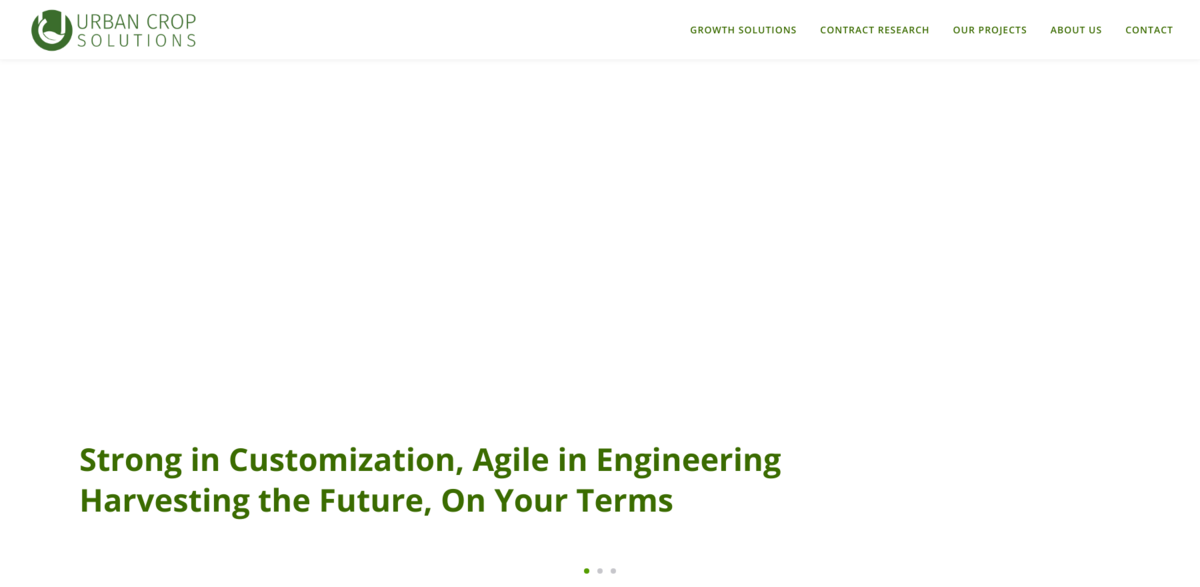Urban Crop Solutions: Revolutionizing Indoor Vertical Farming
Urban Crop Solutions is a turnkey indoor vertical farming solutions provider that’s been shaking up the agricultural scene since 2014. Combining factory engineering with indoor plant biology, they offer end-to-end hydroponic farming systems designed to meet the unique needs of any crop and market. Starting from seed to product, their approach is all about selecting the right plant varieties paired with precise growth algorithms, developed through years of research and hands-on trials at their own research centre. The result? Automated plant factories that can be scaled to fit any business size, enabling year-round crop growth under LED lights—anywhere on the planet. It’s a journey to yield, harvest support, and ultimately, profit.
Main Benefits: Efficiency and Sustainability at the Core
What makes Urban Crop Solutions stand out? It’s their commitment to efficiency and sustainability, backed by impressive numbers:
- Uses 90% less land compared to traditional agriculture
- Produces 20-30 times more food in the same space
- CO2 negative solutions as of 2022
- Eliminates fertilizer run-off and land degradation
- Supports year-round production of nutrient-rich, fresh, and healthy food
Innovative Projects Driving Change
Their projects showcase the versatility and impact of indoor vertical farming. Take Inagro, for example—a sustainable farming research hub that features Agrotopia, a rooftop greenhouse with a vertical farming tower by Urban Crop Solutions. This setup cleverly combines natural sunlight with LED lighting to maximize space and boost cultivation efficiency. Then there’s Inalve, a French biotech partner, where a customized indoor farming system supports sustainable microalgae cultivation. This system uses spectrum-adjustable LED lighting and tailored fertigation to produce high-protein animal feed on a scalable level, all while reducing environmental impact.
Exploring New Frontiers: Bread on Mars
One of the most fascinating collaborations is with Puratos, a global bakery supply company. Together, they’re researching how to bake bread on Mars. Urban Crop Solutions has installed three custom FarmLabs at Puratos’ headquarters near Brussels, Belgium, supporting this out-of-this-world project. Beyond the novelty, it’s a testament to how indoor farming technology can extend even to space exploration missions, pushing the boundaries of what’s possible in food production.
The Team Behind the Innovation
Founded by Maarten Vandecruys and Frederic Bulcaen, Urban Crop Solutions emerged from a clear market gap: the need for sustainable, smart solutions to tackle climate change and urbanization pressures on global food supply chains. Their passion for agricultural technology led them to indoor farming, which they see as the next big revolution. Today, their state-of-the-art research centre is home to plant scientists developing growth algorithms for everything from staple foods to alternative proteins and cultivated meat. Their solutions have already found applications across diverse industries, including biotech and life sciences.
Impact on Sustainable Development Goals (SDGs)
- Goal 2: Zero Hunger
- Goal 3: Good Health and Well-being
- Goal 6: Clean Water and Sanitation
- Goal 9: Industry, Innovation, and Infrastructure
- Goal 11: Sustainable Cities and Communities
- Goal 12: Responsible Consumption and Production
- Goal 13: Climate Action
- Goal 15: Life on Land
Commitment to Sustainability and Circular Agriculture
Urban Crop Solutions doesn’t just talk the talk—they walk the walk. Their approach aligns with the United Nations’ Sustainable Development Goals, aiming to end poverty, protect the planet, and ensure prosperity for all by 2030. Indoor vertical farming plays a huge role here, creating food security through sustainable agriculture that’s accessible year-round, even in harsh climates. Plus, their innovative waste reduction and recycling methods make agriculture more circular. This holistic approach earned them the prestigious SDG Award from the EU Tech Chamber, recognizing their efforts to bring food production closer to consumers and reduce environmental impact.


















